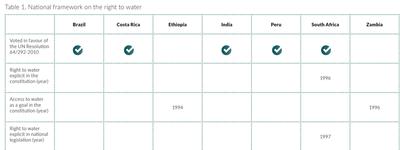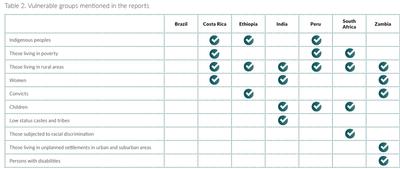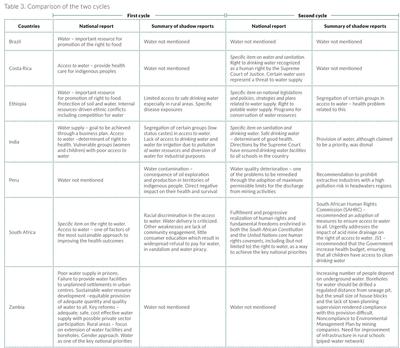Enforcement of water rights
How to cite this publication:
Lara Côrtes, Camila Gianella, Bruce Wilson (2016). Enforcement of water rights. Bergen: Chr. Michelsen Institute (CMI Brief 9)
In 2010, a UN Resolution explicitly recognized the human right to water and sanitation (HRtWS). But has this international recognition improved the ability of poor and marginalized people to secure access to water? Of the countries discussed in this brief, Brazil, Costa Rica, India, Peru and South Africa voted in favor of the resolution, while Ethiopia and Zambia did not. All have experienced significant attempts to enforce the human right to water through litigation, legal reforms, use of UN mechanisms (such as shadow reports), and/or political mobilization, and increased attention have been given to vulnerable and previously neglected areas and groups. This brief explores whether the resolution has been followed by changes in the national framework concerning the human right to water, and in the way countries are reporting on this right to the UN’s Universal Periodic Review (UPR).

Towards an international recognition of the human right to water and sanitation
The international framework on the right to water has expanded over the last decades. In November 2002, the Committee on Economic, Social and Cultural Rights (CESCR) adopted General Comment 15 stating that "water is indispensable for leading a life in human dignity", and that it is a "prerequisite for the realization of other human rights". In 2010, the UN Resolution 64/292 explicitly recognized the HRtWS and acknowledged it as essential to the fulfillment of all human rights. The resolution represents a milestone in linking the realization of these rights and the attainment of the UN Millennium Development Goals (MDG). In the Sustainable Development Goals (SDG), the targets related to access to water and sanitation are broad and involve, among other things, the reduction of pollution, and the protection and restoration of water-related ecosystems.
The impact of the international recognition of the HRtWS depends, among other things, on the incorporation of these rights by the national frameworks and on if/how the UN’s monitoring mechanisms are used to promote them.
The international mechanisms for the protection and promotion of human rights around the world were strengthened with the creation of the UPR in 2006. This reporting system consists of periodic and cooperative monitoring of all UN member States. States present periodic reports of their efforts to improve human rights before the Human Rights Council, and are required to respond to questions from the UN and other States. Civil society, which typically means NGOs, can participate through shadow reports.
We look at the national reports and the summaries of shadow reports of our selected countries for the first two cycles of the UPRs. In the national reports, we investigate what countries report as improvements in and challenges to water rights. In the shadow reports, we evaluate how stakeholders use the UPRs to coerce the states into taking action to improve the situation of water rights and to address violations against these rights.

National framework on the right to water
South Africa is the only country with an explicit right to water in the constitution. In the other countries, the legal right to water has been handled in different ways. In Ethiopia, access to clean water is a social objective. In Zambia, the constitution stipulates that the state shall endeavor to provide clean and safe water. In India, the Supreme Court ruled in the 1990s that the right to water is part of the constitutional and justiciable right of life. In Costa Rica, the Constitutional Chamber of the Supreme Court constructed a constitutional right to drinking water, building on the right to health, life, a clean environment, food and decent living conditions.
While in South Africa national legislation defines access to water as a right (Water Services Act, 1997), all the other countries lack such a national law. In Brazil, the federal law that establishes the basis for the national policy on water resources states that human consumption and livestock shall have priority in situations of water scarcity, but it is not expressed in a rights-based language. Similarly, in Ethiopia, a water resource management proclamation states that domestic water use (for drinking, cooking, sanitation or other domestic purposes) shall have priority over any other use, but it is not expressed as a right. In Costa Rica, the visit of the Special Rapporteur on the human right to safe drinking water and sanitation in 2009, occasioned an initiative to enact a new water law that expressly recognizes water as a human right and that corresponds to the contemporary social and economic reality of the country; lawmakers have yet to create such a law.
National reporting
In the national reports, water is referred both in terms of access and as a resource. When focus is given to access to water, aspects concerning health care are typically mentioned. Discussions related to water as a resource usually involve food security, conflict over water uses and environmental protection. Water access and water as a resource are of course related, since water contamination and certain water uses in regions with water scarcity both threaten the supply of fresh water.
Vulnerable groups are frequently mentioned in the national reports and the summaries of shadow reports from both cycles. Recurring groups are rural communities, indigenous peoples, people in poverty, and women and children.

We have compared the reporting of our selected countries over two cycles. The first cycle took place before the adoption of the 2010 UN Resolution: in 2008 (Brazil, India, Peru, South Africa and Zambia) and in 2009 (Costa Rica and Ethiopia). The second cycle took place after the adoption of the resolution: in 2012 (Brazil, India, Peru and South Africa) and in 2014 (Costa Rica and Ethiopia).

After the approval of the 2010 UN Resolution, the states reported more on the right to water than previously. Whereas only South Africa mentioned the right to water in the national report for the first cycle, four of our countries have done so for the second cycle. This may indicate a connection between the international recognition of this right and the reporting on it. Brazil and Zambia are the only countries to omit the mentioning of water altogether in the national report of the second cycle.
The reports do not refer to legislation related to water, with the only exception of the South African national report for the second cycle. The summary of shadow reports of the second cycle for India takes into account applicable international humanitarian law. References to courts are also rare, with Costa Rica and India being the only countries that mention Supreme Court decisions on the right to water. In India, Supreme Court decisions have ensured drinking water facilities to all schools in the country.
Access to water and threats of pollution
The summaries of shadow reports for Brazil and Costa Rica in both cycles, and for Zambia in the first cycle are the only ones where problems concerning access to water or water as a resource are not mentioned. In the case of Zambia, in particular, one of the worst of our countries in terms of drinking water coverage estimates (in 2015, 16% – piped onto premises, 49% – other improved source and 35% – unimproved and surface water) this absence stands out. In the second cycle, however, challenges concerning access to clean water are mentioned several times.
Apart from questions directly related to water access for vulnerable groups, pollution of water resources is a problem that looms large especially in the shadow reports of several countries in both cycles. India, Costa Rica and South Africa explicitly present pollution of water resources as a threat to the access to drinking water. In Peru, the main concerns are related to indigenous peoples who are negatively affected by extractive industries in their territories, with a high risk of pollution in the headwaters regions.
Climate change
Large seasonal differences and climate change also pose serious threats to water supply in various regions of the world, causing droughts in some places, as in Ethiopia and Peru, or detrimental flooding in other. The Ethiopian state expresses concern about the conservation of water resources in both cycles. In Peru, although the national report for the first cycle does not mention the word water, the national report for the second cycle presents water quality deterioration as a problem that government must remedy through limiting the discharge from mining activities. The summaries of shadow reports for both cycles in Peru refer to water contamination. In the first cycle, contamination is presented as a consequence of oil production and exploration in the territories of indigenous people, and in the second cycle, the prohibition of extractive industries that entail a high risk of pollution in headwaters regions is recommended.
Links to other rights
Access to water is often connected with health, which is not necessarily mentioned as a constitutional right (Costa Rica, Ethiopia, India and South Africa). Other contexts are economic growth (India), housing (South Africa and Zambia), the right to social security, and to an adequate standard of living. When water is taken as a resource, references are typically to the right to food/food security (Brazil and Ethiopia), to environmental protection/sustainable development (Costa Rica, Ethiopia, India, Peru and Zambia) and to development/growth (India).
Conclusions
The resolution does not appear to have given significant rise to instances of specific inclusions of the right to water in the constitutions or in national legislation. In 2006, the international mechanisms for the protection and promotion of human rights around the world were strengthened with the creation of the UPR, and our data show that more countries are reporting on the right to water after the resolution. No doubt, the UN focus has contributed to bringing questions of the right to water higher on the international agenda. This increased attention has turned the spotlight on vulnerable and previously neglected areas and groups, and also added some pressure on politicians to address these matters. However, what remains unclear is if the UPRs and the HRtWS can be identified as having significant impact on the ability of poor and marginalized people to secure access to water. Further research is required to ascertain the utility of these mechanisms for civil society to demand that right through protests, elections, referenda, or litigation. It must be factored in, though, that the UPR (2006) and the UN resolution (2010) are still recent instruments that should not be expected to bring about instant change. With the continued international focus on water topics, further effects on legislation and long term national policies and their efficacy, remain to be seen.


